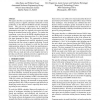Free Online Productivity Tools
i2Speak
i2Symbol
i2OCR
iTex2Img
iWeb2Print
iWeb2Shot
i2Type
iPdf2Split
iPdf2Merge
i2Bopomofo
i2Arabic
i2Style
i2Image
i2PDF
iLatex2Rtf
Sci2ools
ICSE
2000
IEEE-ACM
2000
IEEE-ACM
Verification of time partitioning in the DEOS scheduler kernel
This paper describes an experiment to use the Spin model checking system to support automated verification of time partitioning in the Honeywell DEOS real-time scheduling kernel. The goal of the experiment was to investigate whether model checking could be used to find a subtle implementation error that was originally discovered and fixed during the standard formal review process. To conduct the experiment, a core slice of the DEOS scheduling kernel was anslated without abstraction from C++ into Promela ut language for Spin). We constructed an abstract "test-driver" environment and carefully introduced several ions into the system to support verification. Several experiments were run to attempt to verify that the system implementation adhered to the critical time partitioning requirements. During these experiments, the known error was rediscovered in the time partitioning implementation. We believe this case study provides several insights into how to develop cost-effective ...
ICSE 2000 | Model Checking | Scheduling Kernel | Software Engineering | Subtle Implementation Error |
Related Content
| Added | 25 Aug 2010 |
| Updated | 25 Aug 2010 |
| Type | Conference |
| Year | 2000 |
| Where | ICSE |
| Authors | John Penix, Willem Visser, Eric Engstrom, Aaron Larson, Nicholas Weininger |
Comments (0)

